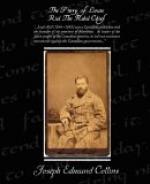“Fare well, my desolate one: may your poor little heart be gladder soon. Could I but be a bird, arid you would have me for a companion, your lamenting should not be for long. We should journey loitering and love-making all the long sweet way, from here to the South, and have no repining.”
Turning around, she perceived two men standing close beside her. She became very confused, and clutched for the blanket to cover her face, but she had strayed away among the flowers without it. Very deeply she blushed that the strangers should have heard her; and she spake not.
“Bon jour, ma belle fille.” It was M. Riel who had addressed her. He drew closer, and she, in a very low voice, her olive face stained with a faint flush of crimson, answered,
“Bon jour, Monsieur.”
“Be not abashed. We heard what you were saying to the bird, and I think the sentiments were very pretty.”
This but confused the little prairie beauty all the more. But the gallant stranger took no heed of her embarrassment.
“With part of your declaration I cannot agree. A maiden with such charms as yours is not left long to sigh for a lover. Believe me, I should like to be that bird to whom you said you would, if you could, offer love and companionship.” M. Riel made no disguise of his admiration for the beautiful girl of the plains. He stepped up by her side and was about to take her hand after delivering himself of this gallant speech, but she quickly drew it away. Passing through a covert as they neared the little settlement, Riel’s sportsman companion walked ahead, leaving the other two some distance in the rear. The ravishing beauty of the girl was more than the amorously-disposed stranger could resist, and suddenly throwing his arms around her he sought to kiss her. But the soft-eyed fawn of the desert soon showed herself in the guise of a petit bete sauvage. With a startling scream she bounded away from his grasp.
“How do you dare take this liberty with me, Monsieur,” she said, her eyes kindled with anger and wounded pride. “You first meanly come and intrude upon my privacy; next you must turn what knowledge you gain by acting spy and eavesdropper, into a means of offering me insult. You have heard me say that I had no lover to sigh for me. I spoke the truth: I have no such lover. But you I will not accept as one; your very sight is already hateful to me.” And turning, with flushed cheek and gleaming eyes, she entered the cosy, cleanly-kept little cottage of her father. But she soon reflected that she had been guilty of an unpardonably inhospitable act in not asking the strangers to enter. Suddenly turning, she walked rapidly back, and overtook the crest-fallen wooer and his companion, and said in a voice from which every trace of her late anger had disappeared.




